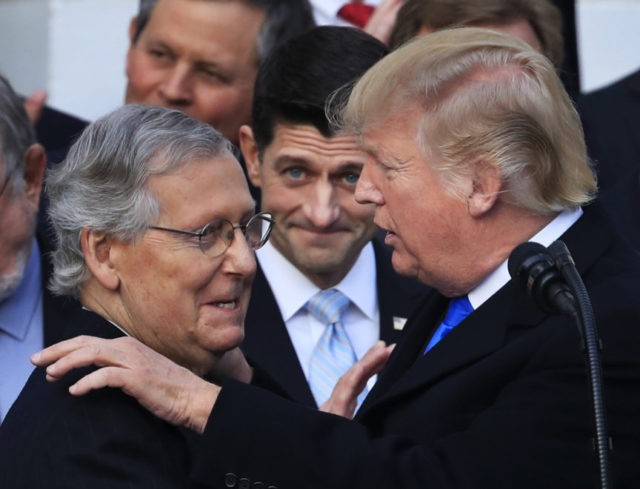House Speaker Paul Ryan has dropped a ton of bricks on the Senate Democrats’ push for a no-strings amnesty, by declaring that he will not allow a House debate on any amnesty-and-immigration bill unless it is supported by President Donald Trump.
“We’re not going to bring immigration legislation through that the President doesn’t support,” Ryan told reporters Tuesday.
The statement is enough to wreck Democrats’ hopes of pushing a no-strings amnesty bill past Trump’s opposition and through the Senate next week.
Many Democratic Senators want to challenge Trump, but many others will not put themselves on the record voting for an amnesty that cannot become law — but which will be hung around their necks in their next election campaign.
Ryan’s statement is also a favor to Senate Majority Leader Mitch McConnell who agreed to schedule a floor debate on amnesty for February 8. He scheduled the debate as the price for quickly ending the Democrats’ January filibuster of the government’s temporary budget.
Ryan said Tuesday:
Let me be very clear about this. We’ll take a bill that the president supports, so we look — put it this way, President Trump made a very serious and sincere offer of goodwill with the reforms that he sent to the Hill. That is what we should be working off of. Those are the bipartisan negotiations that the Majority Leader is conducting on our behalf. So we’re not going to bring immigration legislation through that the President doesn’t support. We’re working on something here in the House, we’re working on bipartisan negotiations, it is going to be a bill that we support, that the President supports.
Ryan’s statement still allows Democrats, liberal Republicans, and media allies to talk up the promises of an amnesty for the so-called ‘dreamers.’ But without a path through the House, Democratic leaders now need to find theatrical alternatives which allow liberal Senators to excite the far-left base while also allowing Democrats in Trump states to avoid putting their thumbprints on an amnesty vote.
Ryan’s statement also suggests that he is willing to see the immigration issue play a large part in the November elections.
McConnell has been very tight-lipped about how will arrange the pending amnesty-and-immigration debate in the Senate. On Tuesday, he told reporters:
I’m going to structure [the floor debate] in such a way that’s fair to everyone … I can’t be specific because there’s no secret plan here to try to push this in any direction. The Senate is going to work its will, and I hope that we will end up passing something.
However, the Senate rules require a supermajority of 60 votes to get something approved, ensuring that Democrats can block Trump’s proposals and Republicans can block Democrats’ proposals. “Whoever gets to 60 wins,” McConnell said.
Democrats were hoping to get support from a bloc of 10 to 15 business-first Republicans led by Maine Sen. Susan Collins. But Ryan’s statement means they likely will lose some of their own Senators and so need to win over roughly 20 Republicans before they can reach the 60-vote threshold. That obstacle likely ensures that few of the 10 to 15 GOP Senators will publicly endorse a Democratic plan that Trump opposes.
Amnesty politics are difficult for Democrats, partly because their pro-amnesty position is deeply unpopular among voters.
In 2014, for example, Sen. Chuck Schumer lost nine seats in the Senate after he spent 2013 trying to pass the huge “Gang of Eight” amnesty through the Senate and the House.
In 2018, ten Democratic Senators face reelection in states won by Trump in 2016. The result is that most of the ten Senators wish to avoid any vote on the debate, and Ryan’s promise to block any Senate bill will help them persuade their pro-amnesty colleagues to postpone difficult votes until after the November election.
In recent statements and speeches, Trump has escalated pressure on Democrats to endorse his four-part amnesty-and-immigration framework. This pressure sets the stage for Trump to convert his rhetoric into a 2018 campaign theme.
Trump’s 2016 immigration policies are very popular among the public, including among blue-collar African-Americans who are a core element of the Democrats’ current electoral base.
In contrast, business groups, Democrats, and the establishment media tout misleading, industry-funded “Nation of Immigrants” polls which pressure Americans to say they welcome migrants, including the roughly 3 million ‘dreamer’ illegals.
The alternative “priority or fairness” polls — plus the 2016 election — show that voters in the polling booth put a much higher priority on helping their families, neighbors, and fellow nationals get decent jobs in a high-tech, high-immigration, low-wage economy.

COMMENTS
Please let us know if you're having issues with commenting.